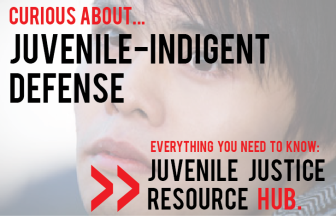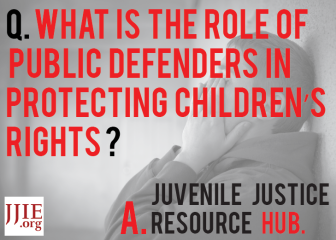[This story is the first in JJIE's series focusing on juvenile indigent defense. Read more from the series here.]
A single phone call made from a trailer home in rural Arizona, where 15-year-old Gerald “Jerry” Gault lived with his family, wound up indelibly altering the landscape of juvenile justice in America.
As Jerry recalled, he grabbed the phone from a visiting friend and told him to get out, after the friend made an obscene phone call to a woman in the neighborhood.
 Following a complaint from the woman, Jerry was taken into custody on June 8, 1964. The authorities neither notified his parents nor mentioned any legal rights, including the right to an attorney.
Following a complaint from the woman, Jerry was taken into custody on June 8, 1964. The authorities neither notified his parents nor mentioned any legal rights, including the right to an attorney.
His mother, who had been working when he was whisked away, located him that night at the Gila County Children's Detention Home, but was forbidden to take him home.
A week later, a county judge sentenced Jerry to almost six years in a juvenile detention facility. (By contrast, an adult charged with the same offense – being in the presence of or hearing someone using “vulgar, abusive or obscene language” – would have faced a maximum sentence of two months in jail.)
After further legal twists, including failed writ of habeas corpus petitions by Gault’s parents in Arizona courts, the case made its way to the U.S. Supreme Court.
The high court’s landmark 8-1 decision in May 1967 freed Gault and established that under the U.S. Constitution, juveniles in delinquency proceedings are guaranteed many of the same due process rights as adults in criminal trials. Among these are the right to counsel, the right to timely notification of charges, the right to confront witnesses, the right to appeal, and the right to avoid self-incrimination.
The majority opinion, written by Justice Abe Fortas, offered biting commentary on the state of juvenile justice as it existed in Arizona. "Under our Constitution the condition of being a boy does not justify a kangaroo court. …Due process is the primary and indispensable foundation of individual freedom," Fortas wrote.
But today, nearly a half-century after the Gault case began, due process rights remain elusive for thousands of indigent juvenile defendants facing felony charges that could lead to years of incarceration.
“Many, if not most, juvenile courts still operate in the pre-Gault mode, as if the defense attorney is irrelevant and unnecessary. As a result, real lawyering cannot occur, and the fair administration of justice is impeded,” the Washington-based National Juvenile Defender Center says in a list of systemic issues that affect representation of juvenile defendants.
The reasons for the gaps between the ideals of Gault and the realities in American courtrooms vary greatly, juvenile justice experts and advocates say.
They include a lack of resources to provide adequate juvenile indigent defense, a patchwork of disparate juvenile justice systems and local laws throughout the country, and, in many courtrooms, a rushed, assembly-line style of juvenile justice.
Right from the start, many indigent juvenile defendants face a decided disadvantage because counsel are often appointed after the initial detention hearing, in which the court decides whether young offenders will be held.
 “The idea that a kid can be in front of a judge and could be locked up with no lawyer there to defend him – I think most people are shocked by that notion,” said Timothy Curry, NJDC’s managing attorney. “The fact that that happens every day in courtrooms around the country is just the reality.”
“The idea that a kid can be in front of a judge and could be locked up with no lawyer there to defend him – I think most people are shocked by that notion,” said Timothy Curry, NJDC’s managing attorney. “The fact that that happens every day in courtrooms around the country is just the reality.”
And research has shown that defendants held pending trial are far more likely to be convicted than those who aren’t held, and, if convicted, those who had been held pending trial are far more likely to be incarcerated than those who were not held.
In some jurisdictions, it’s permissible for a prosecutor, in the absence of a defense attorney, to make a plea offer at the initial hearing, and if the child does not accept the plea, he or she may be detained.
“So you have kids around the country pleading guilty to crimes without ever seeing a lawyer, having no real understanding of the consequences involved with that or whether there was a defense or whether they were actually guilty of what they’re being charged with,” Curry said.
That’s no small matter, as a juvenile adjudication – the term used if a court finds a juvenile committed an act with which he or she is charged -- can have long-term consequences, including losing eligibility for student loans, public housing and military service. An adjudication can also affect immigration status and employment prospects. (If juveniles are tried and convicted in adult court, that can affect voting rights as well.)
“The idea that the worst thing that’s going to happen to a kid is you’re going to put him on probation a few months and everything is going to go away is just false,” Curry said. “Kids lives are severely hampered, particularly in education and employment, by juvenile adjudication.”
Across the country, experts say, many juvenile defendants also quickly waive their right to counsel with little concept of the magnitude of that decision, and before even discussing the ramifications with a lawyer.
That’s a big mistake, says Bart Lubow, director of the Juvenile Justice Strategies Group at the Annie E. Casey Foundation in Baltimore.
“If I were king, I would not allow any juvenile to waive his or her right to counsel on the simple grounds that I’m not sure that they can make a sufficiently informed decision in that regard,” Lubow said.
He says a lot of waivers result not from juveniles concluding they don’t need a lawyer because they plan to plead guilty, but because of adults “manipulating children.”
Such manipulation to coax a child into waiving the right to a lawyer often flows from the belief that juvenile court serves a paternalistic role guided by what it sees as the best interests of the child, Lubow says: “So whether you’re a court clerk, a judge, a prosecutor, an intake officer at probation, whatever, you’re inclined to say, ‘You don’t need to make this adversarial, you know, you’re admitting that you’re guilty, you’ve already told me that. Why do you need a lawyer here? And it’ll go easier on you if we just resolve it now.’”
That sort of sentiment harkens back to the very origins of the juvenile justice system in the late 1800s, with the first juvenile court statute adopted in Illinois in 1899.
Early reformers, as the Supreme Court noted in Gault, were shocked children could essentially be tried as adults and sentenced to long prison terms in which they were housed with adults who were hardened criminals.
“The idea of crime and punishment was to be abandoned. The child was to be ‘treated’ and ‘rehabilitated,’ and the procedures, from apprehension through institutionalization, were to be ‘clinical,’ rather than punitive,” the Supreme Court said in the Gault decision.
The early reformers invoked the notion of “parens patriae” – a Latin phrase for a doctrine that grants the state the power and authority to protect people unable to legally act on their own behalf.
But ironically, however well-intentioned, the doctrine resulted in a juvenile justice system that denied children due process rights, including the right to counsel.
“The right of the state, as parens patriae, to deny to the child procedural rights available to his elders was elaborated by the assertion that a child, unlike an adult, has a right ‘not to liberty, but to custody,’" the Supreme Court said in Gault.
Thus, the court said, when the state intervened because a child was delinquent, “it does not deprive the child of any rights, because he has none. It merely provides the ‘custody’ to which the child is entitled.”
The court concluded the parens patriae doctrine “proved to be a great help to those who sought to rationalize the exclusion of juveniles from the constitutional scheme.”
Indeed, for most of the nation’s history, juvenile defendants were not guaranteed due process rights.
Today, juvenile defendants’ access to quality representation is eroded by the scant attention they sometimes receive from defense attorneys before the crucial detention hearing.
NJDC notes that the vast majority of juvenile court cases are resolved by plea agreements, often at an initial hearing that leaves kids feeling bewildered.
“In sites across the country,” NJDC says, “children have been observed entering plea agreements, only to leave the courtroom and ask, ‘What just happened?’”
That’s not the only part of the process that leaves juveniles baffled. Many don’t understand the Miranda warning, not to mention plea agreements that include complicated terms and probation provisions – actually part of a contract between the state and minors (who aren’t even allowed to enter into other legally binding contracts).
Before the initial hearing, overwhelmed public defenders juggling heavy caseloads often get just minutes to speak with juvenile defendants.
Deborah St. Jean, the director of the Juvenile Protection Division in the Maryland Office of the Public Defender, knows the scene all too well.
In courtrooms throughout Maryland, St. Jean says, public defenders often get only 10 or 15 minutes for this meeting, and they have to cover a lot of ground in that time: What’s the defendant charged with? What are the circumstances of the alleged crime? Is the youth a flight risk or a danger to himself or others? If the defendant is released, will his parents let him stay with them? If not, where can he be placed? What is the child’s educational and family background?
And getting answers, of course, requires building a rapport with the defendants – no small task, when they’re typically feeling immense pressure, and often mistrust adults.
 “Because kids are by nature very distrustful, particularly our clients, it takes more than 10 minutes to sort of convey to a kid, ‘Look, I’m here. I gotcha,’” St. Jean said. “It’s a very fast and a very sort of down-and-dirty endeavor. It’s a very stressful time for the kids because they want to go home and get out of jail so they’re interested predominantly in that."
“Because kids are by nature very distrustful, particularly our clients, it takes more than 10 minutes to sort of convey to a kid, ‘Look, I’m here. I gotcha,’” St. Jean said. “It’s a very fast and a very sort of down-and-dirty endeavor. It’s a very stressful time for the kids because they want to go home and get out of jail so they’re interested predominantly in that."
“So, in order to get a clear picture of the child’s circumstances, the defender needs to get information. So it is unfortunate that these hearings are as hurried as they are. But the court always has this pressure to move things along, and that pressure falls squarely on the defender’s shoulders.”
In fact, one lawyer sometimes handles as many as 20 juvenile defendants in a single hearing in Maryland courtrooms and then enters into plea agreements for them, St. Jean said.
And the defenders are often working without necessary resources because of underfunding. NJDC points out many juvenile defenders – who include attorneys from public defender offices as well as contract attorneys appointed by courts – lack basics like computers, office file cabinets and access to online legal research, not to mention paralegals, investigators, social workers and experts deemed essential to effective representation.
The center also says that for “juvenile defenders across the country, meaningful training, supervision and mentoring opportunities are extremely limited” and “in many public defender offices, juvenile defenders are sent to juvenile court as if it were Siberia.”
This, despite the fact that juvenile defense is a specialty requiring a wide range of skills.
“Just because you can defend an adult doesn’t mean you can defend a juvenile,” St. Jean said. “To be an effective juvenile defender, to represent children, you have to be a jack of all trades. You have to understand adolescent development, neurology. You have to know about the brain sciences and the studies that show children aren’t just miniature adults.”
The Supreme Court has said as much in numerous rulings in which it has noted juveniles’ brains are not fully developed, and youths are more susceptible than adults to peer pressure, more impulsive, more likely to take risks, less likely to consider long-term consequences and – notably – more amenable to rehabilitation. All these factors can weigh heavily in a juvenile case, and a good juvenile defense attorney knows when to raise them.
On top of expertise in juvenile law, juvenile defense requires knowledge of social services for children, the school system, the mental health system and out-of-home placement options, including group homes, foster care, residential programs and treatment facilities.
“You’ve got to be in court, you’ve got to talk to clients, you’ve got to prepare cases, but there’s a lot more sort of social work aspects that become involved when you’re working with kids – school, mental health, substance abuse treatment, home issues such as a parent and kid who don’t want to be in a home together, looking for alternative placements,” said Erin Josendale, an assistant public defender in Prince George’s County, Md.
Juvenile defenders are often looked down upon by others in the legal profession and even within public defender offices, suffering from a “kiddie-court mentality where stakeholders do not believe that juvenile court is important,” NJDC says.
“It’s often seen as a training ground or a dumping ground for attorneys because historically juvenile court has not and, in many cases, still is not viewed with respect within defender offices,” said Marc Schindler, executive director of the Justice Policy Institute in Washington and a former juvenile public defender.
Juvenile defenders are often paid less than other defense attorneys, with juvenile defense seen as a steppingstone to a better-paying position.
Nonetheless, many juvenile defenders choose juvenile defense as a career and are renowned for their passionate dedication to defending children against the power of the state.
And quality representation is essential to indigent children facing serious charges.
In the Gault decision, the Supreme Court said: “The child requires the guiding hand of counsel at every step in the proceedings against him."
But today, Casey’s Bart Lubow said, “We fall woefully short of that ideal. ... We are nowhere near where we need to be, certainly nowhere near where we need to be if the standard that’s going to apply is the ‘my-child’ test. And the my-child test would ask: What would you want and have for your kid if it was your kid facing the power of the state?”
Pingback: Child Welfare Watch News Digest — November 14, 2013 | Child Welfare Watch